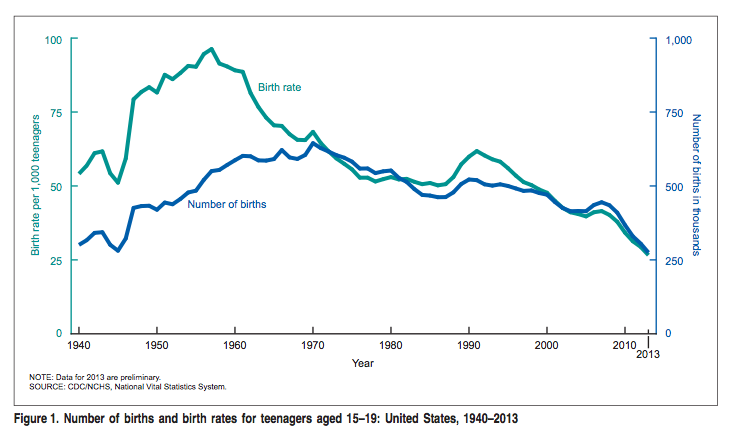In 2009, Colorado did something relatively unheard of: The state began providing free birth control to women.
As part of the Colorado Family Planning Initiative, the state department of public health made long-acting forms of contraception like IUDs and other devices available to women across the state, primarily to low-income residents who may have lacked access due to economic constraints. Six years later, the results are startling: The New York Times reports that teen pregnancies across the state fell by some 40 percent between 2009 and 2013, while the abortion rate declined by 42 percent. According to the Times, it’s young, unmarried women in less than favorable economic circumstances who have benefited the most; by having better access to birth control, young women were more likely to finish college and escape a cycle of poverty that having a child at a young age can bring.
The news of the CFPI’s success isn’t just great for Colorado; it’s also yet another blow against abstinence-only education. For decades, the anti-contraception movement (spearheaded primarily by evangelical Christians) has argued that contraception, from condoms to the “morning after pill,” are morally and ethically problematic, and that the only pious form of sex education is to encourage abstinence until marriage. After all, sex is only for people who love each other, right?
Socially conservative states like Alabama, Arkansas, Georgia, and Mississippi actually have higher rates of teenage pregnancy.
Ha, no. For years, data has shown just how poorly abstinence-only education cuts down on teen and unwanted pregnancies across the United States. A July report from the non-profit Guttmacher Institute found that 19 states—primarily Southern, socially conservative states like Alabama, Arkansas, Georgia, and Mississippi—stress (rather than simply cover) both abstinence and the importance of sex within marriage. Shockingly, a 2014 Centers for Disease Control and Prevention report shows that it’s those states that actually have higher rates of teenage pregnancy. This isn’t exactly new information: A 2007 report from Mathematica Policy Research found that abstinence-only programs have had “no impacts on rates of sexual abstinence.”

By contrast, sex education that emphasizes contraception and safe sex tends to lead to a decline in teenage pregnancies. According to the CDC, teenage birthrates in the U.S. have plummeted since the mid-1950s, and a comprehensive study in the American Journal of Public Health, cited by the agency, attributes 86 percent of that decline to the introduction of contraception education in American public schools. (The other 14 percent is chalked up to good old-fashioned contraception). “The decline in US adolescent pregnancy rates appears to be following the patterns observed in other developed countries,” the study concludes, “where improved contraceptive use has been the primary determinant of declining rates.”

Colorado’s experiment, when compared to the national experience with contraception and abstinence-only education, has one clear conclusion: Teens love to have sex, and no amount of finger-wagging will stop that. Sure, teens are waiting longer and longer to begin engaging in sexual intercourse, according to Guttmacher, but that’s not specifically because of abstinence-only education; it’s due to an overall decline in high-risk behavior among the current generation of young people. Colorado’s experience proves that equipping young people to control their reproductive destiny is far, far more realistic than attempting to indoctrinate them with a moral standard that runs counter to the delightful pleasures of human biology. It may be time to put abstinence-only education to bed once and for all.




